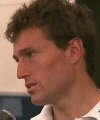Andrea De Cesaris - Racing Summary

Andrea de Cesaris weathered the many insults and putdowns thrown
at him over a considerable number of seasons, being branded anythig from "wild",
"dangerous" down to "incompetent" and "idiot",
to become a well-liked and, finally, respected professional.
Born in Rome into considerable wealth, de Cesaris started in
karts in 1976 aged 17, winning the World Karting Champinoship in 1977, and
with a brief stop in Italian F3 he ran for Tim Schenken's Tiga team in the
British F3 series in 1978, and in 1979 he threw away a certain Championship
title with a succession of errors despite 6 victories, placing runner-up to
Chico Serra. Taken under the Marlboro wing in 1980, he joined Ron Dennis'
F2 team project 4 in 1980 and ran well, and by season's end, still only 21,
de Cesaris was making his F1 debut for the Marlboro-supported Alfa Romeo team
and qualyfing in the top ten for his first race in Montreal, proving his obvious
pace and raw skill seen in the lower leagues. But a full F1 season for Ron
Dennis, who had by now acquired the McLaren team, was a humiliating disaster,
the quick youngster making numerous errors, suffering several big shunts and
seeming out of his depth. His connections kept him in F1, however, and the
"crazy man" was afforded a drive at Alfa Romeo for 1982, and he
proceeded, amidst the still problematic mistakes to impress at last, taking
a superb pole at Long Beach and leading the race until he crashed out. Further
encouraging drives came in 1983, especially leading at Spa, and Andrea took
two second places; he appeared to be calming down and to have begun to channel
his natural talent into something worthwhile, but a move to Ligier in 1984
undid much of the good work.
He struggled with the car, writing off a lot of them especially
in 1985, and by mid-season in that year Ligier sacked him and his career looked
in doubt. Few at the time would have believed that he would still be racing
full time F1, becoming the second most experienced GP driver of all-time,
nearly a decade later. Joining Minardi for a quiet season in 1986 and then
Brabham in 1987 (taking 3rd at Spa), his money kept him in demand from lower-field
teams and he ran occasionally well for Rial in 1988. At Dallara he seemed
more erratic than ever, at times a mobile chicane to everyone in sight (including
his own team mate Caffi who was rammed while running 2nd at Phoenix by his
lapped team mate) but on occasion an accomplished performer. But a further
season at Dallara in 1990 left his career firmly in a rut and many observers
felt enough was enough. Everyone recognised that he was quick, but with the
occasional exception his race-craft was still apparently sorely lacking. But
a break in 1991 came with the new Jordan team, and Andrea finally showed of
his real calibre in the better machinery, establishing the jovial Irish rookies
with a succession of fine drives, gaining several points placings, pushing
the big names hard, and sadly missing out on what would and should have been
a brilliant 2nd at Spa behind Senna when the car broke toward the end of the
race. Never had his F1 stock been as high, and though he was released by Jordan
he secured a berth at Tyrrell purely on merit, his Marlboro money now a thing
of the past.
Still racing hard and with infectious enthusiasm, he won Tyrrell's
confidence early on as both a racer and development driver, taking several
more good finishes and again impressing as one of the reformed characters
of GP racing. But a second year with Tyrrell in 1993 saw him fade a little,
slightly out-performed by team-mate Katayama (which with hindsight was no
disgrace) and he was released by them at the end of the year, his F1 career
now apparently over. But he was happily destined to break the 200 GP barrier,
deputising in 1994 for Irvine at Jordan and repaying his old boss (and F3
rival 15 years before) with a superb 4th place at Monaco, a circuit where
he invariably drove well. He was chosen as Wendlinger's replacement at Sauber
for the rest of the season though he had vacated the seat before Japan, but
unfortunately there was little of his Monaco expertise on view.
In his youth a man of impetuous, hot blooded and nervous temperament
both in and out of the car, his early reputation for crashes and what sometimes
amounted to hooliganism was fairly justified, if a little overplayed, but
that shielded a very real racing talent that only really became generally
accepted 10 years after his F1 debut. His boyish enthusiasm remained throughout
his 14 year tenure in the sport, and in later years he greatly matured as
a man and won a lot of friends through his easy charm and humour. His eventual
GP start tally totalled 208 races, 2nd in the all-time list only to Patrese.
He may never have won a race, and may have been prone to error especially
in his early years, but he was very quick when inspired and it was good to
see that he finally managed to do his ability justice at last in the 1990's.
Source: Ian Harrison
